C6-ceramide nanoliposomes target the Warburg effect in chronic lymphocytic leukemia
- PMID: 24367685
- PMCID: PMC3868606
- DOI: 10.1371/journal.pone.0084648
C6-ceramide nanoliposomes target the Warburg effect in chronic lymphocytic leukemia
Abstract
Ceramide is a sphingolipid metabolite that induces cancer cell death. When C6-ceramide is encapsulated in a nanoliposome bilayer formulation, cell death is selectively induced in tumor models. However, the mechanism underlying this selectivity is unknown. As most tumors exhibit a preferential switch to glycolysis, as described in the "Warburg effect", we hypothesize that ceramide nanoliposomes selectively target this glycolytic pathway in cancer. We utilize chronic lymphocytic leukemia (CLL) as a cancer model, which has an increased dependency on glycolysis. In CLL cells, we demonstrate that C6-ceramide nanoliposomes, but not control nanoliposomes, induce caspase 3/7-independent necrotic cell death. Nanoliposomal ceramide inhibits both the RNA and protein expression of GAPDH, an enzyme in the glycolytic pathway, which is overexpressed in CLL. To confirm that ceramide targets GAPDH, we demonstrate that downregulation of GAPDH potentiates the decrease in ATP after ceramide treatment and exogenous pyruvate treatment as well as GAPDH overexpression partially rescues ceramide-induced necrosis. Finally, an in vivo murine model of CLL shows that nanoliposomal C6-ceramide treatment elicits tumor regression, concomitant with GAPDH downregulation. We conclude that selective inhibition of the glycolytic pathway in CLL cells with nanoliposomal C6-ceramide could potentially be an effective therapy for leukemia by targeting the Warburg effect.
Conflict of interest statement
Figures
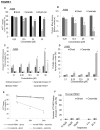
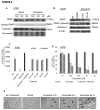
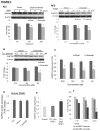
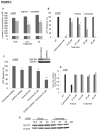
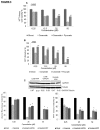
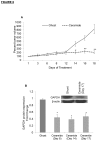
References
-
- Chalfant CE, Ogretmen B, Galadari S, Kroesen BJ, Pettus BJ et al. (2001) FAS activation induces dephosphorylation of SR proteins; dependence on the de novo generation of ceramide and activation of protein phosphatase 1. J Biol Chem 276: 44848-44855. doi: 10.1074/jbc.M106291200. PubMed: 11502750. - DOI - PubMed
Publication types
MeSH terms
Substances
Grants and funding
LinkOut - more resources
Full Text Sources
Other Literature Sources
Research Materials

